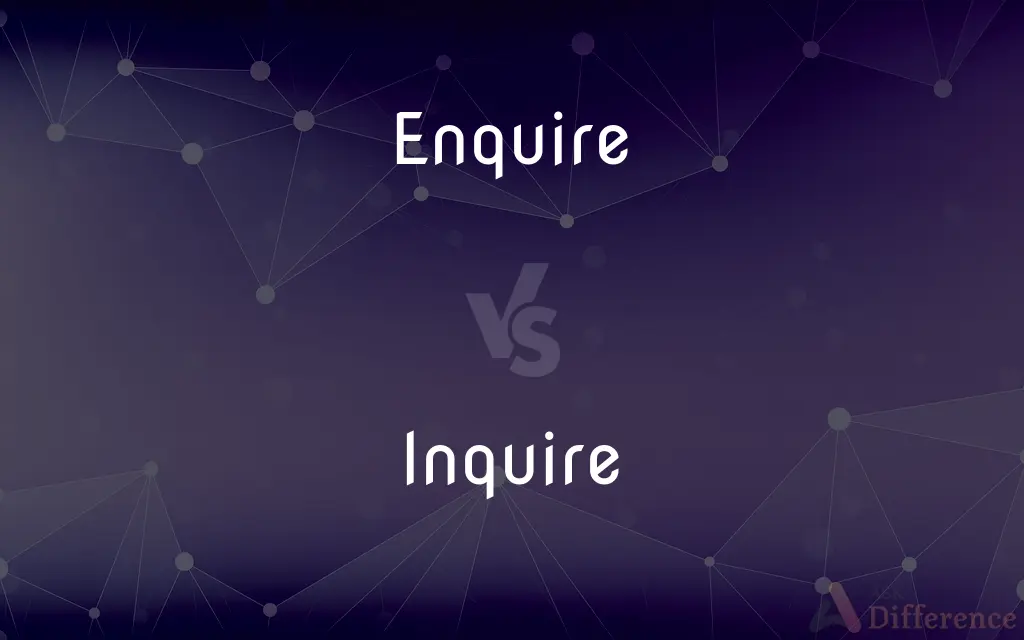Enquire vs. Inquire — What's the Difference?
Edited by Tayyaba Rehman — By Fiza Rafique — Updated on October 5, 2023
"Enquire" and "Inquire" both mean to seek information, but "enquire" is often used for general queries, while "inquire" is more formal and often pertains to official investigations.

Difference Between Enquire and Inquire
Table of Contents
ADVERTISEMENT
Key Differences
Both "enquire" and "inquire" refer to the act of asking for information. While they are often used interchangeably, "enquire" is commonly used in British English for everyday or casual questions. "Inquire", on the other hand, is preferred in American English and tends to have a more formal connotation.
"Inquire" is more frequently used in official or formal contexts, especially when referring to official investigations or proceedings. For instance, a business might "inquire" about a potential partnership, or a lawyer might "inquire" into the details of a case.
The choice between "enquire" and "inquire" can be influenced by regional language preferences. While British English often leans towards "enquire" for general questions, American English typically uses "inquire" in most situations.
Both words have derivatives that maintain their respective nuances. For example, "enquiry" and "inquiry" follow the same general versus formal distinction as their root words.
Historically, both words were used interchangeably without much distinction. However, over time, especially in British English, a subtle differentiation developed, leading to the current nuanced usage.
ADVERTISEMENT
Comparison Chart
Meaning
To ask for information
To seek information, especially in a formal context
Usage
More casual, general questions
More formal, often for investigations or proceedings
Preferred Region
British English
American English
Example
Enquiring about a friend's health
Inquiring into a legal matter
Derivative
Enquiry
Inquiry
Compare with Definitions
Enquire
To pose a question or query.
Can I enquire if the meeting is still on?
Inquire
To ask for information in a formal context.
I need to inquire about the application process.
Enquire
To express a doubt or seek clarification.
May I enquire why the event was postponed?
Inquire
To conduct an official investigation.
The agency will inquire into the matter.
Enquire
To investigate or look into a matter informally.
I'll enquire at the front desk about our reservation.
Inquire
To pose a question with an expectation of a detailed or specific response.
Let me inquire about the availability of the conference room.
Enquire
To make a casual request for knowledge.
I just wanted to enquire about your day.
Inquire
Another term for enquire
Enquire
To ask for information or details.
Did you enquire about the train timings?
Inquire
To seek information by asking a question
Inquired about prices.
Enquire
Ask for information from someone
I enquired where he lived
‘How well do you know Berlin?’ he enquired of Hencke
He enquired about cottages for sale
Inquire
To make an inquiry or investigation
Inquire into the extent of the corruption.
Enquire
Investigate; look into
The task of political sociology is to enquire into the causes of political events
Inquire
To ask, especially politely or formally
The host inquired why we were leaving so soon.
Enquire
Variant of inquire.
Inquire
To ask questions about (something); investigate or analyze
Economists inquiring whether markets behave differently during a recession.
Enquire
(intransitive) To make an enquiry.
He enquired about the availability of rental bicycles in the town.
Inquire
To ask (about something).
Enquire
To ask about (something).
Inquire
(intransitive) To make an inquiry or an investigation.
Enquire
See Inquire.
Inquire
To call; to name.
Enquire
Inquire about;
I asked about their special today
He had to ask directions several times
Inquire
To ask a question; to seek for truth or information by putting queries.
We will call the damsel, and inquire.
Then David inquired of the Lord yet again. And the Lord answered him.
Enquire
Conduct an inquiry or investigation of;
The district attorney's office investigated reports of possible irregularities
Inquire into the disappearance of the rich old lady
Inquire
To seek to learn anything by recourse to the proper means of knowledge; to make examination.
And inquireGladly into the ways of God with man.
Enquire
Have a wish or desire to know something;
He wondered who had built this beautiful church
Inquire
To ask about; to seek to know by asking; to make examination or inquiry respecting.
Having thus at length inquired the truth concerning law and dispense.
And all obey and few inquire his will.
Inquire
To call or name.
Inquire
Inquire about;
I asked about their special today
He had to ask directions several times
Inquire
Have a wish or desire to know something;
He wondered who had built this beautiful church
Inquire
Conduct an inquiry or investigation of;
The district attorney's office investigated reports of possible irregularities
Inquire into the disappearance of the rich old lady
Inquire
To seek knowledge or clarity on a subject.
We should inquire about the project's status.
Inquire
To investigate or delve into a topic in depth.
The detective decided to inquire further into the case.
Common Curiosities
Are "enquire" and "inquire" interchangeable?
While often used interchangeably, "enquire" is typically for casual questions, while "inquire" is for formal contexts.
Is it wrong to use "enquire" in a formal setting?
While not inherently wrong, "inquire" might be more appropriate in very formal contexts.
Is "enquire" more British, and "inquire" more American?
Yes, "enquire" is more common in British English, while "inquire" is preferred in American English.
Does "inquire" always imply an official investigation?
Not always, but it often carries a more formal tone.
Are there situations where only one of the two words should be used?
In extremely formal settings or official investigations, "inquire" is usually preferred.
Why are there two words for essentially the same action?
Both words historically had similar meanings; differentiation developed over time due to regional and contextual nuances.
Is there a difference in pronunciation?
Generally, both words sound very similar, but pronunciation can vary by region.
What's a synonym for "inquire"?
"Investigate" or "probe" can be synonyms, especially in formal contexts.
If I use "enquire" in American writing, will it be considered incorrect?
Not incorrect, but "inquire" is more common and might be expected.
Can I use "enquiry" and "inquiry" in the same way as "enquire" and "inquire"?
Yes, "enquiry" and "inquiry" follow similar distinctions: general versus formal.
How should I decide which word to use?
Consider the context: if it's casual, "enquire" works; for formal situations, choose "inquire".
Do other languages have similar distinctions between these terms?
The distinction is more prominent in English; other languages might not differentiate as much.
Can "enquire" be used for formal business communication?
It can, especially in British English. However, "inquire" might be more universally accepted in formal contexts.
Is one word more ancient or original than the other?
Both words have ancient roots, and neither is particularly "more original" than the other. They've just evolved differently in usage.
Does "enquire" have derivatives like "inquire" does with "inquiry"?
Yes, "enquire" has "enquiry" as its noun form.
Share Your Discovery

Previous Comparison
Extortion vs. Racketeer
Next Comparison
Priory vs. ChurchAuthor Spotlight
Written by
Fiza RafiqueFiza Rafique is a skilled content writer at AskDifference.com, where she meticulously refines and enhances written pieces. Drawing from her vast editorial expertise, Fiza ensures clarity, accuracy, and precision in every article. Passionate about language, she continually seeks to elevate the quality of content for readers worldwide.
Edited by
Tayyaba RehmanTayyaba Rehman is a distinguished writer, currently serving as a primary contributor to askdifference.com. As a researcher in semantics and etymology, Tayyaba's passion for the complexity of languages and their distinctions has found a perfect home on the platform. Tayyaba delves into the intricacies of language, distinguishing between commonly confused words and phrases, thereby providing clarity for readers worldwide.
















































